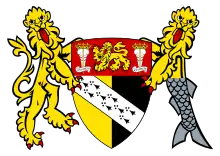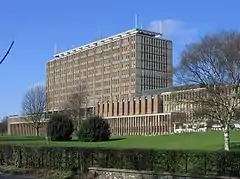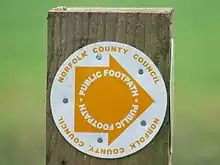Norfolk County Council
Norfolk County Council is the top-tier local government authority for Norfolk, England. Its headquarters are based in the city of Norwich.
Norfolk County Council | |
|---|---|
 Coat of arms | |
 Council logo | |
| Type | |
| Type | |
| Leadership | |
Chair of the Council | |
Leader of the Council | |
Head of service | Tom McCabe since May 2019 |
| Structure | |
| Seats | 84 councillors |
 | |
Political groups |
|
Length of term | 4 years |
| Elections | |
| First-past-the-post | |
Last election | 4 May 2017 |
Next election | 4 May 2021 |
| Meeting place | |
 | |
| County Hall, Norwich | |
| Website | |
| www | |
Below it there are 7 second-tier local government district councils: Breckland District, Broadland District, Great Yarmouth Borough, North Norfolk District, Norwich City, King's Lynn and West Norfolk Borough, and South Norfolk District.
History


In 1902, the council consisted solely of landowners.[1]
Chairmen of the council prior to 1974
1889-1902 Robert Gurdon, 1st Baron Cranworth
1902-1912 Sir William Browne-ffolkes
1912-1920 John Holmes Esq.
1920-1925 Ailwyn Fellowes, 1st Baron Ailwyn
1925-1941 Russell Colman Esq.
1941-1950 Sir Henry Upcher
1950-1966 Sir Bartle Edwards
1966-1969 Douglas Sanderson Esq.
1969-1974 John Hayden Esq. : From this point onwards the role of Chairman became ceremonial with the council being run by a Leader.
The council, as currently constituted, was established in 1974 following the implementation of the Local Government Act 1972, which replaced the two previous county authorities (the County Borough of Norwich and the County of Norfolk) with a single top tier authority for the whole of Norfolk.
Politics
Norfolk County Council is currently (since May 2016) run by a Conservative Administration.
Norfolk County Council has traditionally been known as a Conservative stronghold, being run by them from its formation until 1993.
For the period 1993 until 2001 no one party had overal control.
The Conservatives won a majority in the 2001 local elections and held the authority until 2013.
The countryside is almost all Conservative territory, with few areas being strong for the Liberal Democrats.[2] The urban areas of Norfolk have always been more mixed in their loyalties, however, and seats in Norwich, Great Yarmouth, and King's Lynn are often held by the Labour Party. From 2009 to 2013 the Greens held the greatest number of Norfolk County Council electoral divisions within the city of Norwich.
Following the county elections of May 2013, Norfolk County Council was under no overall control, the Conservatives being the largest party on the council, with 40 Conservative councillors, UKIP having 15, Labour 14, the Liberal Democrats 10, and the Green Party 4, plus 1 Independent councillor. In a by-election in August 2013, the Labour Party gained one seat from UKIP, thus taking over from UKIP as the second largest political group on the county council. Norfolk County Council's ruling administration was made up of an alliance of non-Conservative councillors (14 UKIP, 15 Labour, 10 Liberal Democrat, 4 Green and 1 independent) with a Labour leader until May 2016. The alliance collapsed in May 2016 when the Green Party withdrew its support resulting in the Council electing a Conservative Leader, and that in turn lead to a minority Conservative administration running the council until May 2017.
In the Local Elections of May 2017 the Conservatives won an overall majority of the seats and were able to form a majority administration. The results were Conservative 55, Labour 17, Liberal Democrats 11 with both UKIP and the Green Party losing all their seats on the council.
In April 2014 a project to establish an incinerator at King's Lynn was scrapped by the Labour lead alliance under Cllr George Nobbs when the members of the council voted by 48 to 30 to end the authority's contract with the firm Cory Wheelabrator after a heated debate at County Hall in Norwich on 7 April. That decision was directly followed by a cabinet meeting, in which the administration voted unanimously to axe the scheme.[3] This decision meant the council had to pay compensation to the company of several million pounds.
In May 2018 just one week after being re-elected Leader of the council for a further year Cllr. Cliff Jordan resigned from his position and his seat on the council due to ill health. The following month at an Extraordinary Meeting of the Council Cllr. Andrew Proctor was elected Leader.
Election results
- For the election results, see Norfolk County Council elections
Economy and business
The council spends an average of £56.5 million a month with suppliers.[4]
Education
See also List of schools in Norfolk
The council is in charge of all Nursery, Primary and Secondary state schools throughout Norfolk which are not academies, but not Tertiary education. There are three nursery schools, 359 primary schools, 35 secondary schools, one all-through school, one free school, one short stay school and 11 special schools.[5]
The council provides a school finder for parents to find children a school.[6] The primary school curriculum is set by the government, and recorded on Directgov.[7] The secondary (high) school curriculum is set by the government, and recorded on Directgov. There are compulsory subjects which are needed to be followed in Norfolk and England.[8][9][10][11]
In Year 9 (sometimes Year 8), children are required to pick their GCSE options for the forecoming year.[8][10][11][12][13] In England, a student must take at least two optional choices.[10][13]
In February 2013, Ofsted inspectors judged that vulnerable children in the county were at risk.[14] Shortly afterwards, the regulator expressed concern about the county's educational provision.[15] Three years later, in August 2016, Ofsted found that Norfolk County Council had still failed to address the regulator's earlier judgements (in February and August 2013, respectively) that the council's arrangements for the protection of children and for services for looked after children were 'inadequate'.[16] In 2017 after further inspection the rating was raised to 'requires improvement' after considerable progress in the department.
Health and Social Care
The council is responsible for coordinating and managing the Adult Social Care of the population of Norfolk. This work was overseen by the Adult Social Care Committee based at County Hall. However, in May 2019 the committee was abolished and its responsibilities transferred to the Cabinet Member for Adult Social Care, Public Health and Prevention.
Since 2012 the Health and Wellbeing Board for Norfolk and Waveney has been responsible for Public Health in the county. The board has been chaired by Cllr. Bill Borrett since 2017, it comprises representatives from most NHS bodies such as the five Clinical Commissioning Groups and the three Norfolk Acute Hospitals as well as Norfolk and Waveney's County and District Councils.
See Healthcare in Norfolk for the details of the different NHS bodies charged with delivering health in the county.
Transportation
Norfolk County Council is responsible for maintaining Norfolk's 10,000 kilometres (6,200 mi) road networks and bus routes.[17] They often go into schools and promote road safety to students.[18]
Conservation

Norfolk County Council offered grant aid for landscape conservation, submitted to the Director of Planning and Transportation.[19] Many historic buildings in the county are protected by the Norfolk Historic Buildings Trust, established in 1977, which is under the guidance of the county council.[20] Between 1995 and 2000, the Trust played a major role in restoring the Denver Mill site, at a cost of over £1 million.[19]
Notable members
- Steffan Aquarone
- Walter Keppel, 9th Earl of Albemarle
- Jack Boddy
- Michael Carttiss
- Judith Chaplin
- Richard Toby Coke
- Sir Thomas Cook
- Sidney Dye
- George Edwards
- John Garrett
- Paul Hawkins
- Dave Rowntree
- William Benjamin Taylor
- John Wodehouse, 2nd Earl of Kimberley
- Albert Hilton, Baron Hilton of Upton
- Lilias Rider Haggard
References
- Blue, Leonard Anderson (1902). The relation of the governor to the organization of executive power in the states ... University of Pennsylvania. p. 42.
- "Proposals for future unitary structures: Stakeholder consultation". Communities and Local Government. Archived from the original on 23 August 2007. Retrieved 21 May 2012.
- "Norfolk County Council ends King's Lynn incinerator contract". www.lynnnews.co.uk.
- "Norfolk County Council ::: Spending Dashboard ::: Open Spending Data bought to life". spendnetwork.github.io.
- "Childrens Services – Schools". Norfolk County Council. 7 March 2012.
- "School Finder". Norfolk County Council. February 2012.
- "The National Curriculum for five to 11-year olds". DirectGov (DIRECT.GOV.UK). 8 September 2011.
- "Your Child's Education". DirectGov (DIRECT.GOV.UK). 7 September 2011.
- "The National Curriculum for 11 to 16-year olds". DirectGov (DIRECT.GOV.UK). 8 September 2011.
- "Choosing subjects for Years 10 and 11: what's compulsory and what's optional". DirectGov. 1 April 2012.
- "Qualifications and Curriculum Development Agency (QCDA)". QCA. 21 May 2012.
- "Choices in Year 9(/8)". DirectGov (DIRECT.GOV.UK). 1 April 2012.
- "Choosing subjects for Years [9] 10 and 11: what's compulsory and what's optional". DirectGov (DIRECT.GOV.UK). 1 April 2012.
- "Vulnerable children in Norfolk 'put at risk', says report". BBC News Online. BBC. 22 February 2013. Retrieved 24 November 2016.
- "Norfolk schools' Ofsted report raises 'considerable concern'". BBC News Online. BBC. 14 May 2013. Retrieved 24 November 2016.
- Archer, Graham (5 August 2016). "Direction issued to Norfolk County Council". gov.uk/government/publications/. Retrieved 24 November 2016.
- "Travel and Transport". Norfolk County Council. 7 January 2012.
- "Road Safety". Norfolk County Council. 29 March 2012.
- "STANDARD CONDITIONS APPLYING TO OFFERS OF NORFOLK COUNTY COUNCIL GRANT AID FOR LANDSCAPE CONSERVATION". Norfolk County Council. 2 April 2009.
- "Introduction". Norfolk Historic Buildings Trust. Retrieved 21 May 2012.